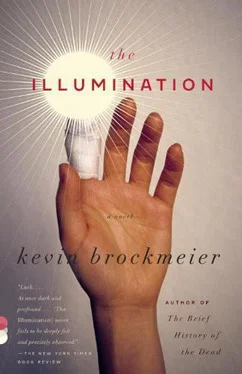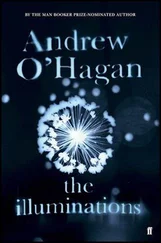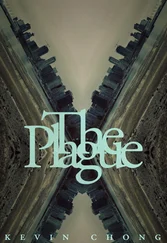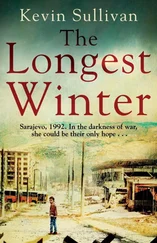“Well, this is it, Ms. Poggione,” the boy said, and she realized they had reached the hotel.
“Thanks. What’s your name now?”
“John Catau.”
“I thought that was your father’s name.”
“It is. I’m a junior, or unofficially I am. My dad is Jon Catau: J-o- no h-n . I’m John Catau: J-o- with an h-n. ”
“Well, John-with-an- h , you can call me Nina.”
“Nina.” He took her wrist, rubbing his thumb along the pulse point as if he were calming an injured animal, and she understood what she should have all along: that he was hitting on her. His touch was warmer and more muscular than she had supposed it would be. “Are you sure I can’t buy you a drink?” he said.
She risked stretching her mouth to smile at him. “Some other time.” And she opened the door and went into the hotel.
Upstairs, standing at her bathroom mirror, she drew her lower lip cautiously away from her teeth. The flesh sent out a spike of pain, shimmering as she exposed it to the open air. She had ruptured some fragile seal over the sore, and blood came brimming from the threadlike crack, spilling into the pocket of her gums. Though the edges of the canker had softened, she knew from experience that it would get worse before it got better.
She sat on the ledge of the tub and made her ritual evening phone call. Wallace didn’t answer, so she left him a message. Each time her lips came together or her teeth bit into a letter, she had that terrible sewing-needle sensation. She tried to conceal her discomfort, but the effort gave her voice an oddly convulsive sedative quality, as if her limbs were twitching while she slept: “Hey, honey. I know you ha v e p lay rehearsal tonight, b ut I’ m wi p ed out, and I’ m going to slee p , so I’ m calling early. Your m o mm a lo v es you. I ho p e you had a p er f ect day. Don’t b urn the house down. Re memb er, the Stegalls are right next door i f you can’t reach m e and there’s an e m ergency.”
She hung up. For the thousandth time, she reflected that she should write a story that used no b ’s , f ’s , m ’s, p ’s, or v ’s, one she could deliver without aggravating her mouth. “A Story to Combat the Pain,” she would call it.
But what if it wasn’t her lips that were ulcerated?
She would have to write a second story to avoid her hard palate, one without any c ’s, d ’s, g ’s, h ’s—oh so many letters.
And a third that would let the tip of her tongue lie still, a story that was all vowels and labials, unspooling with a long underwater sound.
So then: “ Three Stories to Combat the Pain.”
She washed her face and brushed her teeth, all but the bottom incisors, then changed into her pajamas and slipped into bed. Four more days of readings, she thought. Four more airplanes to four more cities. She wondered how Wallace was doing without her. Had he remembered to lock the door? Was he eating the food she had Tupperwared? He was the kind of boy who would nibble at a hot dog, offering half of it to a stray animal, and consider himself fed for the day—but he was fourteen, and old enough now, they had decided, to stay home alone while she was on tour.
Fourteen! In another year, unless she recovered as mysteriously as she had fallen ill, she would have been this strange sick creature for fully one-third of his life.
She yawned, and her mouth flickered at the boundary of her vision, as if a distant ship were sending out signals in Morse code.
——
Once there was a country where no one addressed the dead except in writing. Whenever people felt the urge to speak to someone they had outlived, they would take a pen and set their thoughts down on paper: You should have seen the sun coloring the puddles this morning , or Things were so much easier when you were alive, so much happier , or I wanted to tell you I got all A’s on my report card, plus a C in algebra . Then they would place the message atop the others they had written, in a basket or a folder, until the summer arrived and they could be delivered.
In this country it rained for most of the year. The landscape was lush with the kinds of trees and ivies that flourish in wet weather, their leaves the closest green to black. The creeks and pools swam with armies of tiny brown frogs. Usually, though, in the first or second week of June, the clouds would thin from the air little by little, in hundreds of parallel threads, as if someone were sweeping the sky clean with a broom, and the drought would set in. This did not happen every summer, but most. Between the glassy river to the west of the country and the fold of hills to the east, the grass withered and vanished, the puddles dried up, and the earth separated into countless oddly shaped plates. Deep rifts formed in the dirt. It was through these rifts that people slipped the letters they had written. The dead were buried underground, and tradition held that they were waiting there to collect each sheet of paper, from the most heartfelt expression of grief to the most trivial piece of gossip:
You won’t believe it, but Ellie is finally leaving that boyfriend of hers .
What I want to know is whether you think I should take the teaching job .
The crazy thing is, when the phone rang last night, I was absolutely sure it was you .
Do you remember that time you dropped your earring in the pond and it surprised that fish?
I just don’t know what I’m doing these days .
So it was that people surrendered the notes they had saved with a feeling of relief and accomplishment, letting them fall through the cracks one by one, then returned home, satisfied that they had been received.
This was the way it had always been, for who knows how long, with the dead turning their hands to the surface of the earth, and no orphans praying out loud to their parents, and no widows chitchatting with the ghosts of their husbands, and all the wish-it-weres and might-have-beens of the living oriented around a simple stack of paper and a cupful of pens. Then something very strange happened.
In Portland the bookstore was a labyrinth of aisles and staircases, with shelves that stretched to the rafters and let out the sugary smell of old paper, columns that shone with textured gold paint, and the floor was a worn industrial concrete that resembled a pond abounding with gray-green silt, and as she walked through the stacks she could see the vague form of her reflection passing underneath her, vanishing and reemerging in the grit and gloss of the stone, and on the store’s top level, where she gave her reading, the art books stood directly behind the audience in a long panorama of faces, so that Ms. Erin Colvin from Hillsdale and Mr. Jim Fristoe from the Pearl District seemed to sit alongside Andy Warhol and Mona Lisa and one of Modigliani’s radiant, blank-eyed women, and when it came time for Nina to take questions and someone asked her how she developed her titles, she gave her usual answer, comparing the title to a target toward which she shot the arrow of a story and confessing that she had never been able to write so much as the first sentence until she had taken careful aim. In the case of the story she had just presented, she said, a fairy tale of sorts, she had tried “A Fable Beginning with a Glimpse of Blue Sky,” “A Fable Ending in a Thunderclap and a Rain Shower,” and “A Fable Occurring Between Two Thunderstorms” before she hit upon “A Fable from the Living to the Dead,” after which followed a dozen variations on that one idea—“A Fable to the Dead,” “A Fable for the Dead,” “A Fable for the Living from the Dead,” “A Fable from the Dead to the Living”—until at last she settled upon “A Fable for the Living.”
Читать дальше












